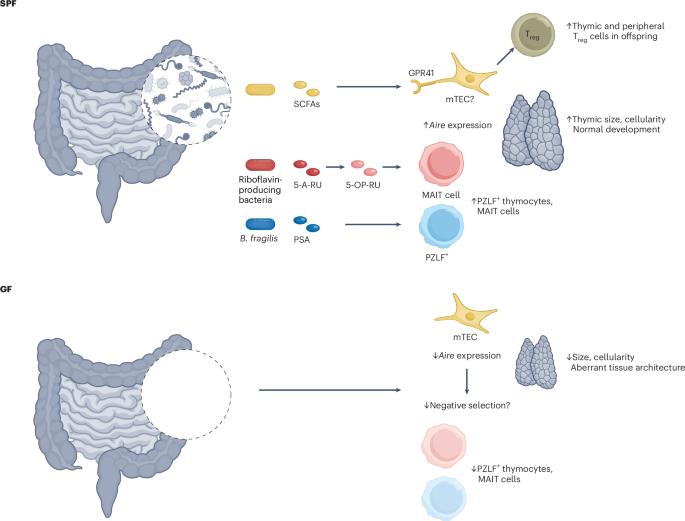肠道微生物代谢物在T细胞生命周期中的作用
IF 27.6
1区 医学
Q1 IMMUNOLOGY
引用次数: 0
摘要
T细胞是适应性免疫系统的基石,在宿主-微生物界面中起着关键作用。肠道微生物组通过产生多种被宿主细胞感知的小分子来深刻地影响T细胞生物学。这些微生物代谢物调节T细胞生命周期的各个方面,从细胞发育到分化、活化到衰竭。最近的研究发现,微生物衍生的分子,包括短链脂肪酸、次级胆汁酸和色氨酸代谢物,是T细胞功能的有效调节剂。然而,微生物代谢物- t细胞相互作用的全部范围在很大程度上仍未被探索。这篇综述提出了将肠道微生物代谢物与T细胞命运和功能的离散阶段联系起来的机制框架。扩大我们对这些复杂的宿主-微生物组相互作用的理解将揭示免疫调节的新方面,并启发微生物组指导的感染,自身免疫性疾病和癌症免疫治疗的治疗策略。本文章由计算机程序翻译,如有差异,请以英文原文为准。


The role of gut microbial metabolites in the T cell lifecycle
T cells, a cornerstone of the adaptive immune system, have pivotal roles at the host–microorganism interface. The gut microbiome profoundly influences T cell biology by producing a diverse repertoire of small molecules that are sensed by host cells. These microbial metabolites regulate all aspects of the T cell lifecycle, from cell development to differentiation and activation to exhaustion. Recent studies have uncovered microbially derived molecules, including short-chain fatty acids, secondary bile acids and tryptophan metabolites, as potent regulators of T cell function. However, the full scope of microbial metabolite–T cell interactions remains largely unexplored. This Review presents a mechanistic framework linking gut microbial metabolites to discrete stages of T cell fate and function. Expanding our understanding of these intricate host–microbiome interactions will reveal new aspects of immune regulation and inspire microbiome-guided therapeutic strategies for infections, autoimmune diseases and cancer immunotherapy. Tran et al. discuss the role of the gut microbiome and gut microbiome-derived metabolites in T cell biology.
求助全文
通过发布文献求助,成功后即可免费获取论文全文。
去求助
来源期刊

Nature Immunology
医学-免疫学
CiteScore
40.00
自引率
2.30%
发文量
248
审稿时长
4-8 weeks
期刊介绍:
Nature Immunology is a monthly journal that publishes the highest quality research in all areas of immunology. The editorial decisions are made by a team of full-time professional editors. The journal prioritizes work that provides translational and/or fundamental insight into the workings of the immune system. It covers a wide range of topics including innate immunity and inflammation, development, immune receptors, signaling and apoptosis, antigen presentation, gene regulation and recombination, cellular and systemic immunity, vaccines, immune tolerance, autoimmunity, tumor immunology, and microbial immunopathology. In addition to publishing significant original research, Nature Immunology also includes comments, News and Views, research highlights, matters arising from readers, and reviews of the literature. The journal serves as a major conduit of top-quality information for the immunology community.
 求助内容:
求助内容: 应助结果提醒方式:
应助结果提醒方式:


